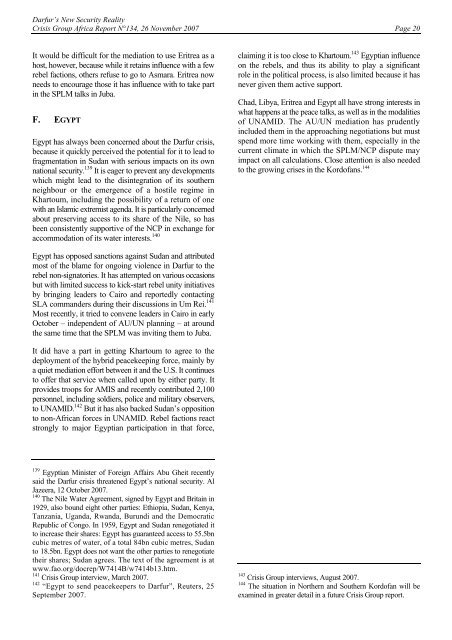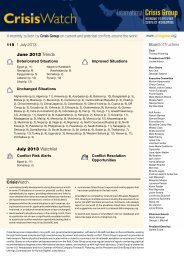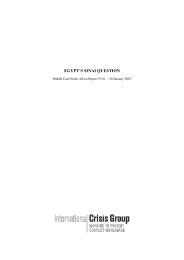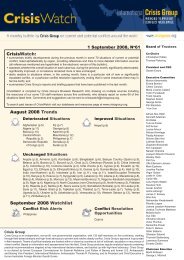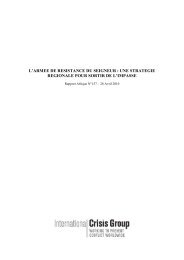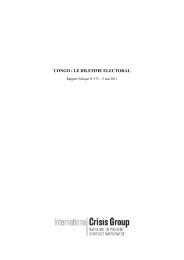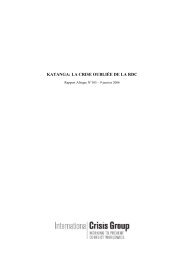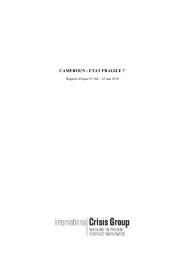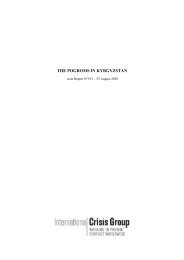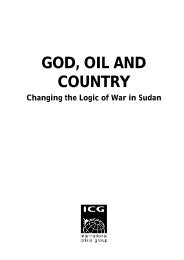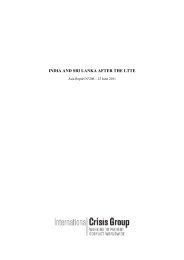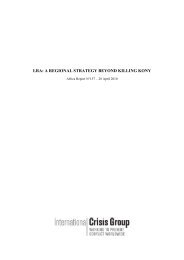sudan - International Crisis Group
sudan - International Crisis Group
sudan - International Crisis Group
You also want an ePaper? Increase the reach of your titles
YUMPU automatically turns print PDFs into web optimized ePapers that Google loves.
Darfur’s New Security Reality<br />
<strong>Crisis</strong> <strong>Group</strong> Africa Report N°134, 26 November 2007 Page 20<br />
It would be difficult for the mediation to use Eritrea as a<br />
host, however, because while it retains influence with a few<br />
rebel factions, others refuse to go to Asmara. Eritrea now<br />
needs to encourage those it has influence with to take part<br />
in the SPLM talks in Juba.<br />
F. EGYPT<br />
Egypt has always been concerned about the Darfur crisis,<br />
because it quickly perceived the potential for it to lead to<br />
fragmentation in Sudan with serious impacts on its own<br />
national security. 139 It is eager to prevent any developments<br />
which might lead to the disintegration of its southern<br />
neighbour or the emergence of a hostile regime in<br />
Khartoum, including the possibility of a return of one<br />
with an Islamic extremist agenda. It is particularly concerned<br />
about preserving access to its share of the Nile, so has<br />
been consistently supportive of the NCP in exchange for<br />
accommodation of its water interests. 140<br />
Egypt has opposed sanctions against Sudan and attributed<br />
most of the blame for ongoing violence in Darfur to the<br />
rebel non-signatories. It has attempted on various occasions<br />
but with limited success to kick-start rebel unity initiatives<br />
by bringing leaders to Cairo and reportedly contacting<br />
SLA commanders during their discussions in Um Rei. 141<br />
Most recently, it tried to convene leaders in Cairo in early<br />
October – independent of AU/UN planning – at around<br />
the same time that the SPLM was inviting them to Juba.<br />
It did have a part in getting Khartoum to agree to the<br />
deployment of the hybrid peacekeeping force, mainly by<br />
a quiet mediation effort between it and the U.S. It continues<br />
to offer that service when called upon by either party. It<br />
provides troops for AMIS and recently contributed 2,100<br />
personnel, including soldiers, police and military observers,<br />
to UNAMID. 142 But it has also backed Sudan’s opposition<br />
to non-African forces in UNAMID. Rebel factions react<br />
strongly to major Egyptian participation in that force,<br />
139 Egyptian Minister of Foreign Affairs Abu Gheit recently<br />
said the Darfur crisis threatened Egypt’s national security. Al<br />
Jazeera, 12 October 2007.<br />
140 The Nile Water Agreement, signed by Egypt and Britain in<br />
1929, also bound eight other parties: Ethiopia, Sudan, Kenya,<br />
Tanzania, Uganda, Rwanda, Burundi and the Democratic<br />
Republic of Congo. In 1959, Egypt and Sudan renegotiated it<br />
to increase their shares: Egypt has guaranteed access to 55.5bn<br />
cubic metres of water, of a total 84bn cubic metres, Sudan<br />
to 18.5bn. Egypt does not want the other parties to renegotiate<br />
their shares; Sudan agrees. The text of the agreement is at<br />
www.fao.org/docrep/W7414B/w7414b13.htm.<br />
141 <strong>Crisis</strong> <strong>Group</strong> interview, March 2007.<br />
142 “Egypt to send peacekeepers to Darfur”, Reuters, 25<br />
September 2007.<br />
claiming it is too close to Khartoum. 143 Egyptian influence<br />
on the rebels, and thus its ability to play a significant<br />
role in the political process, is also limited because it has<br />
never given them active support.<br />
Chad, Libya, Eritrea and Egypt all have strong interests in<br />
what happens at the peace talks, as well as in the modalities<br />
of UNAMID. The AU/UN mediation has prudently<br />
included them in the approaching negotiations but must<br />
spend more time working with them, especially in the<br />
current climate in which the SPLM/NCP dispute may<br />
impact on all calculations. Close attention is also needed<br />
to the growing crises in the Kordofans. 144<br />
143 <strong>Crisis</strong> <strong>Group</strong> interviews, August 2007.<br />
144 The situation in Northern and Southern Kordofan will be<br />
examined in greater detail in a future <strong>Crisis</strong> <strong>Group</strong> report.


